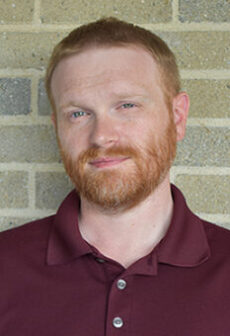Despite the reality of death, we share in the endurance of Christ

Shawn Reeves
Living the World l Shawn Reeves
Thirty-Second Sunday in Ordinary Time l Nov. 6
2 Maccabees 7:1-2,9-14; Psalm 17:1,5-6,8,15; 2 Thessalonians 2:16 — 3:5; Luke 20:27-38
Few things force us to face our mortality more than illness. Suddenly, we lose something of ourselves. Our bodies do not live and breathe as they did before. Our concentration is hindered. And, at times, we find ourselves isolated and alienated from others. In various ways, we find illness “depriving us of this present life.” For this reason, many of the ancient Church Fathers saw all illness as a kind of foreshadowing of death and a moment of necessary encouragement and recognition of God’s continued kindness and care for the ill. It is natural, then, that there is frequently a unity between hope in recovery and hope in the resurrection.
In our first reading from Maccabees, we can see the developing revelation of the resurrection of the body already present in the Jewish community well before the time of Jesus. This explicit expectation of a “resurrection to life” was written about 150 years before the birth of Jesus, emerging from events around the same time, during the Greek occupation of modern day Israel. Here, in the words of the third brother, we find one of the most beautiful testimonies of faith in the Scriptures. In these words humility, gratitude, fidelity, and hope all mingle together, erupting in this short but profound testimony of devotion: “It was from Heaven that I received these; for the sake of his laws I disdain them; from him I hope to receive them again.”
It is a recognition that the whole of his body is a gift from heaven, and, so, heaven will remain faithful to that gift, even after death. He would rather be detached from that gift for a moment than keep it through misuse of it. And, he parts with it in hopeful expectation that God will restore his body to him but in glory, maintaining that original gift from heaven and renewing it. As St. Paul says, this is “everlasting encouragement.”
“OUR JOY WILL BE FULL”
While our first reading is occupied with confidence in the resurrection, our Gospel dwells on suspicion in it. Juxtaposed to the trust of the seven brothers is the skepticism of the Sadducees. What is important to notice, though, is the disparity between what the skeptics think resurrection to be and what Jesus proclaims it actually is.
Death will continue to be uncomfortable. Illness will continue to be uncomfortable. “But the Lord is faithful.” He gives with intention and secures the welfare of those gifts always, even through death and illness.
Jesus makes clear that this idea of resurrection is limited and that such a resurrection would be an incompletion of the goods God wants to provide for us. Contrary to the habits of this life in which we “marry and remarry,” those in resurrected glory do not, “for they are like the angels.” In other words, their bodies have become “supernaturalized” and are no longer tethered to the limitations and habits of our bodies now. Raised up by Him, our bodies will become strengthened in glory and more alive so that our joy will be full.
It is uncomfortable to dwell on death. We experience death as an intrusion on life as it ought to be, because, in a way, it is. “God did not make death, nor does he rejoice in the destruction of the living,” the Scriptures tell us (Wisdom 1:13).
Death will continue to be uncomfortable. Illness will continue to be uncomfortable. “But the Lord is faithful.” He gives with intention and secures the welfare of those gifts always, even through death and illness. And in this hope, we share in the endurance of Christ.
—
SHAWN REEVES is the director of religious education at St. John’s Catholic Newman Center in Champaign. He and his family attend St. Elizabeth of Hungary Church in Thomasboro.





